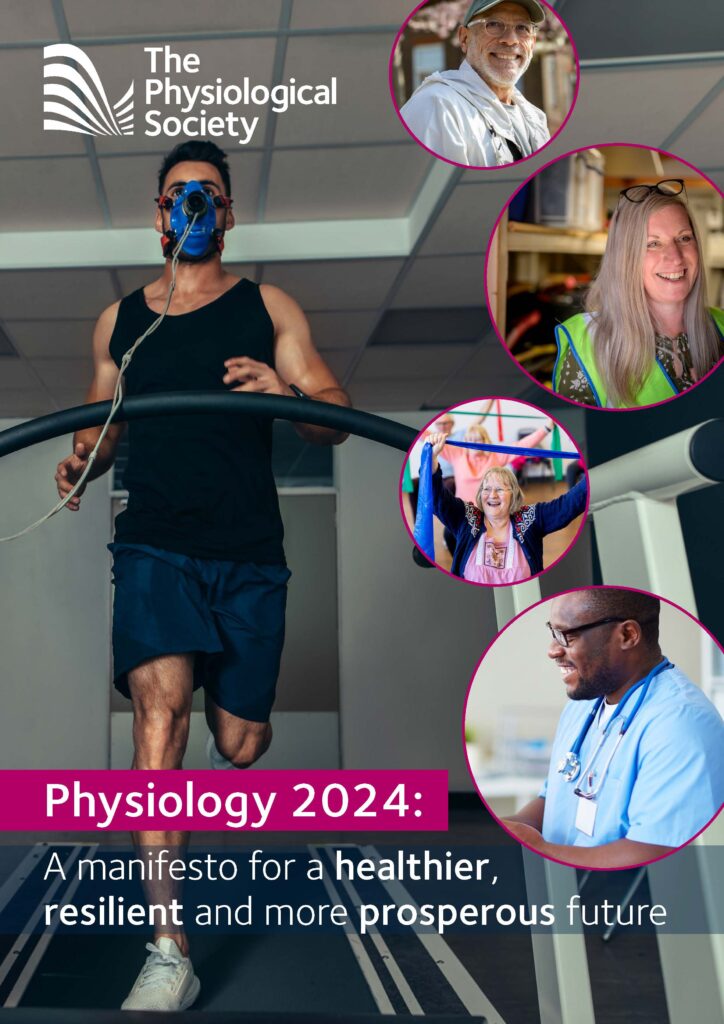Physiology 2024: Manifesto for the General Election
Physiology at the forefront
The science of physiology is about how our bodies work to keep us healthy and alive. It explains the mechanisms of living things, underpinning how the body works in health, determining what goes wrong in disease and shaping how we respond to the challenges of everyday life.
As we approach the next general election in the UK, this manifesto highlights the vital role of physiology in catalysing discoveries and fostering healthier, safer, and productive lives. It proposes targeted, strategic actions to harness physiological science for improving public health, spurring economic growth through health innovations, and enhancing resilience against environmental threats, with a strong emphasis on the preventative health agenda.
Our manifesto ‘Physiology 2024’ brings together a collection of asks for the next UK Government that have been drawn from our recent policy reports. These reports are linked below.
Our asks of the next government
A healthier future
The UK’s ageing population presents significant public health challenges, including increased demand on healthcare services and a growing gap between life expectancy and healthy life expectancy. These challenges underline the importance of a preventative approach to health maintenance and disease prevention.
Aim: Government should leverage physiological insights for developing comprehensive health strategies that prioritise prevention, early intervention, and chronic disease management, thereby improving the public’s overall health and reducing the need for medical interventions. This ‘health in all policies’ approach will help to break the link between ageing and age-related disease through a combination of research, public health messaging and government action.
Our asks of the next government
| Deliver a preventative health strategy that prioritises physiological research and considers how all aspects of government policy can contribute to preventing health issues before they arise. This includes increased investment in preventative measures against age-related diseases and the consequences of co-morbities. |
| Make the UK the best place in the world to conduct, commercialise and benefit from healthy ageing research by establishing a Global Coordinating Centre for Healthy Ageing Research and Development to lead in the field. This centre will not only focus on treating age-related diseases but also on preventing them, fostering public-private partnerships and international collaboration in preventative health research. |
For more information, see our reports:
A more prosperous future
The rise in economic inactivity among over 50s has contributed to high vacancies and labour shortages, which has been particularly stark since the COVID-19 pandemic. The impact of increasing numbers of people who cannot work because of a long-term health condition will be exacerbated by long-term demographic changes. As the UK’s population ages in future decades, a lack of fit and healthy older workers will hamper the country’s long-term prosperity.
Aim: Older people with health conditions are supported to continue working, benefiting their own mental and physical health as well as contributing to the UK’s economy and society.
Our asks of the government
| Deliver a preventative health strategy that prioritises physiological research and public health initiatives focused on preventing health issues before they arise. This includes increased investment in preventative measures against age-related diseases and the incorporation of health-focused policies across all levels of government. |
| Make the UK the best place in the world to conduct, commercialise and benefit from healthy ageing research by establishing a Global Coordinating Centre for Healthy Ageing Research and Development to lead in the field. This centre will not only focus on treating age-related diseases but also on preventing them, fostering public-private partnerships and international collaboration in preventative health research. |
| Support those with health conditions back into work by using health and employment support services to offer tailored support to older people rooted in physiological evidence. |
For more information, see our report:
Understanding ‘Early Exiters’: The case for a healthy ageing workforce strategy’
A more resilient future
Climate change presents a direct threat to public health – and the UK is ill prepared to deal with the consequences. The UK is experiencing longer, hotter and more frequent heatwaves, and the government must improve the resilience of our population and infrastructure. Building heat resilience in an equitable way will require a combination of individual and structural approaches along with the combined expertise and experience of physiologists, public health professionals, clinicians and healthcare scientists.
Aim: To increase the heat resilience of the UK population, with a particular focus on
those most vulnerable such as pregnant women and older people
Our asks of the government
| Formation of a Heat Adaptation Research Exchange Taskforce, chaired by the Cabinet Office working closely with other government departments and devolved administrations. This Taskforce will tackle research gaps and increase the speed of research translation into policy and action. |
| Introduction of statutory guidance on maximum temperatures for different levels of activity and types of Personal Protective Equipment worn. |
| Improvement in early warning systems for heatwaves and creation of a public health campaign focused on improving longterm resilience and preparedness for extreme heat amongst vulnerable groups. |
Red Alert: Developing a Human-centred National Heat Resilience Strategy
A more innovative future
Artificial intelligence (AI) offers transformative potential for healthcare, particularly in enhancing diagnostic accuracy, personalising treatment plans, and pioneering preventative health measures, informed by the latest physiological research.
Aim: To maximise the potential of AI to transform healthcare through the safe, equitable and responsible deployment of AI tools. Guided by physiological research, these will improve diagnosis and treatment, advance preventative health strategies, and enhance patient care and public health outcomes.
Our asks of the government
| Improve the guardrails for AI and health to ensure AI tools reduce health inequality gaps rather than exacerbating them. The development and deployment of AI models must recognise that the physiological and medical research on which they are trained is often unrepresentative of populations. There should be a focus on the incorporation of a diverse range of physiological data into AI models so they are effective and reliable across a wide spectrum of populations, accounting for variations in genetics, ages, environments, and lifestyles. |
| Place physiological plausibility at the heart of AI healthcare research and development with a clear framework to ensure AI driven models, predictions and conclusions align with known physiological principles. |
| Give confidence in the safety and efficacy of AI tools as medical devices by working with regulators such as the MHRA to make physiological evidence a foundation of the regulatory approval process and utilise the centralised coordination function of the AI and Digital Regulations Service to ensure consistency across relevant regulators. |
For more information, see our report:
A more inspired future
The UK’s leadership in research and development, particularly in the physiological sciences, is essential for addressing current health challenges and fostering economic innovation. Attracting and retaining top research talent is crucial to maintain the UK’s status as a global leader in higher education and scientific research. This has huge economic benefits, for example, the provision of physiology higher education in the UK provides an impact of £22.6 billion in added income to the economy annually¹.
Aim: To strengthen the UK’s position as a global leader in health and physiological research and education, with a vibrant research culture that values innovation and fosters an inclusive, supportive, and dynamic scientific community. This will attract and retain scientists across the broad ecosystem, support areas such as in vivo research, as well as improve public health outcomes and drive economic
productivity.
Our asks of the government
| The UK should match international competitors by investing at least 3% of GDP in R&D by 2030 by supporting universities and research institutes as well as improving knowledge exchange between academia and industry. |
| The NHS should ensure clinical academics and trainees are able to commit appropriate time and resource to research work as important and complementary to their clinical responsibilities. |
| Ensure the Postgraduate Research Funders and Providers Forum created by UKRI is resourced to support postgraduate researchers and builds a research culture which recognises and rewards their contribution to the UK’s research base. |
| Reduce the upfront visa costs to the levels charged by comparator countries in order to attract and retain researchers. |
| Maintain an international outlook and shape the successor to the Horizon Europe research programme, scheduled to launch in 2028. |
¹ The methodology used to calculate this figure can be found in The Physiological Society’s 2022 report Contribution of physiology education and training to the UK economy


